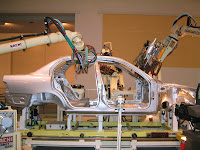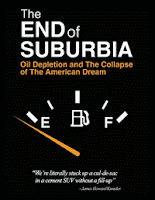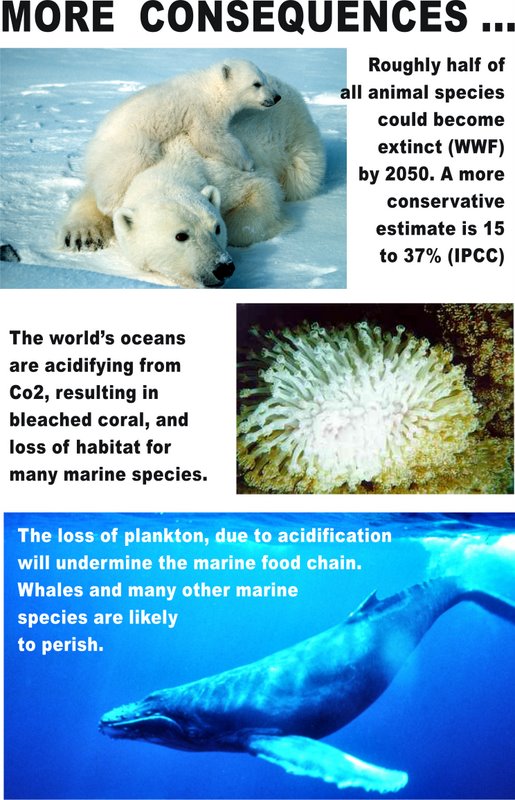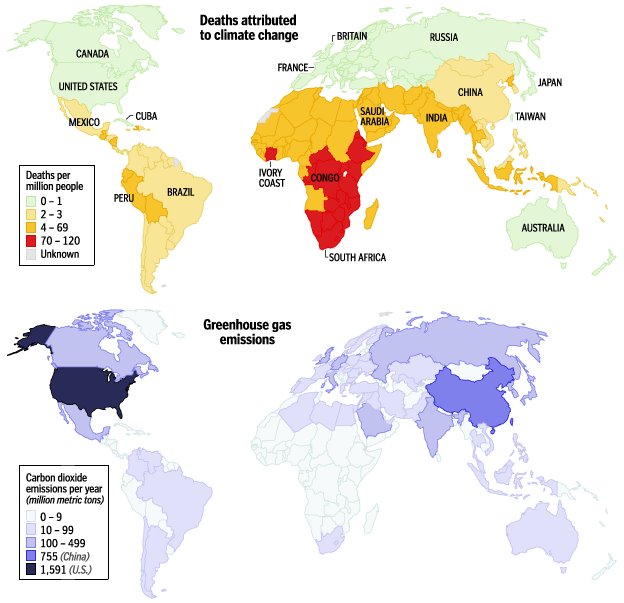Tuesday, May 4, 2010
Strong critique of UTERN
There is something called UTERN - or University of Toronto Environmental Network - a collection of students who get to dispense a $30,000 student levy to other students to facilitate environmental projects or events. Is this a good or bad thing for student environmentalism? I will argue here that UTERN's existence is detrimental to student environmentalism because it de-politicizes it and creates an atmosphere in which student environmentalism is identified with a kind of apolitical non-controversial acceptance of the status quo.
UTERN refuses to take a stand against the tar sands, the central symbol of environmental destruction in Canada. Collectively UTERN will not condemn the tar sands - which became evident to me a couple of years ago at a showing of a film on the tar sands which many UTERN members attended. Not one of their number spoke up against it.
The status quo is entirely unacceptable however: we are in the midst of a climate crisis and students need to be more vigilent against it and the forces responsible for it - including the very corporations that run this university. The corporatization of U of T is a fundamental part of this story. Large multinational corporations such as Exxon Mobil and Barrick Gold can be view as neutral vehicles that can be steered in many directions - thus the concept of corporate social responsibility and "green capitalism" - or we can recognize that some industries are inherently unsustainable and cannot be reformed.
Extraction industries (oil, mining, etc) cannot be reformed because what they do will always damage the environment to a degree that is unacceptable. There is no such thing as "sustainable mining." But apolitical student environmentalism says neither yay nor nay on this question - it is not spoken of at all - with the result that the status quo - unsustainable mining - continues unabated and U of T is the training ground for it.
Students Against Climate Change was founded three years ago, at University of Toronto, in response to the climate crisis. Our hope was to encourage the kind of response that students in other countries have shown. Even in the United States students have demonstrated a stronger response to the environmental crisis than in Canada. Thousands of students rally for needed change in every other country than Canada. Here such movements barely exist and after three years it is obvious why: it has been killed by apolitical student environmentalism which shies away from controversey or taking a stand on anything.
SACC put on hundreds of events on climate change and related issues: films, lectures, conferences, etc. SACC did more of these events than any other group at U of T, before or sincce. The vast majority of those who attended were not students, however. They were over age 30 and from outside the university - mostly concerned citizens, activists, some university staff and faculty. The students were conspicuously absent from all those events - especially the students in UTERN. We collected the emails of about 4,500 people at these events over three years and perhaps less than 5% were students.
Some UTERN members have said that they reject street activism as ineffective. But without it those that are female among them would not be attending university or have the vote. Street activism has always been the vanguard of social and political change, as the womens' rights movement and civil rights movements demonstrate. This is apparently unknown to them or unappreciated by them. So is the fact that street activism is done as much to bring together communities as to effect social change politically.
So what do they do instead? Do they attend and organize educational events instead - conference, lectures, etc - on the subject of climate change? A small handful have done a few things like this, but not to any great degree. There is a growing climate change movement in Toronto, but they are conspicuously absent from this movement as well, according to the more serious activists. So what does UTERN do? Of what does their so-called "activism" consist? Merely attending classes and meetings and fun social events? In what way does that constitute activism?
Perhaps UTERN is merely a stepping stone for those seeking careers in the growing environmental - a field increasingly apolitical and devoid of spirit, absorbed into the corporate worldview that is most responsible for the environmental crisis. Or perhaps it is an elite social club, funded through a student levy which pays for its social events (food, transporation for outings, plan trips to conferences overseas, etc). Why go to a climate change conference in Europe when you don't attend them here and when such trips exacerbate climate change through emissions? What does this mean for the student environmental movement at Univesity of Toronto? It means that it does not exist, or more precisely it exists in small pockets that are fragmented and ineffective.
The University of Toronto has been taken over by the very corporations most responsible for environmental damage, but instead of challenging that, most of the students have chosen to turn a blind eye to it, and to allow themselves to be absorbed into a kind of unconscious "group think" that allows for the unsustainable status quo to continue unchallenged - and they have done this without even being aware of it.
They perhaps imagine that they will be hired by governments or coprorations and change them from the inside; but they will be changed by them. They already have been, it seems. Environmentalism has been co-opted and reduced to platitudes and feel good slogans with the words "green" and "sustainable" in them. The spirit and life has been taken out of it, resulting in greenwash of corporations. There is no response to factory farming or oil spills or the dumping of mine waste in rivers or climate injustice by UTERN. They seem to avoid so-called "politics", even though environmentalism is inherently political and to act apolitically is itself a political act, in cooperation with prevailing powers, in favour of the status quo. Not everyone on UTERN is of this mind, but most are. One wonders what they really hope to acheive.
UTERN reps have said they don't represent the student envionmental movement - they just fund it - but the direction they've taken is decidely against certain tactics and views and in favour of others. They have decided to cooperate with the Administration and the corporations that run them, and make student environmentalism into a vehicle for funding for themselves (UTERN members are paid or receive work-study grants) and careerism (resume-padding).
UTERN represents the death of real student environmentalism at University of Toronto. And this at the time when the climat crisis was never worse. We see now why it is so bad, and why it gets worse every year: UTERN is a microcosmic reflection of the indifference of the larger society which produced it - a society of in which the tars sand continues to expand.
UTERN refuses to take a stand against the tar sands, the central symbol of environmental destruction in Canada. Collectively UTERN will not condemn the tar sands - which became evident to me a couple of years ago at a showing of a film on the tar sands which many UTERN members attended. Not one of their number spoke up against it.
The status quo is entirely unacceptable however: we are in the midst of a climate crisis and students need to be more vigilent against it and the forces responsible for it - including the very corporations that run this university. The corporatization of U of T is a fundamental part of this story. Large multinational corporations such as Exxon Mobil and Barrick Gold can be view as neutral vehicles that can be steered in many directions - thus the concept of corporate social responsibility and "green capitalism" - or we can recognize that some industries are inherently unsustainable and cannot be reformed.
Extraction industries (oil, mining, etc) cannot be reformed because what they do will always damage the environment to a degree that is unacceptable. There is no such thing as "sustainable mining." But apolitical student environmentalism says neither yay nor nay on this question - it is not spoken of at all - with the result that the status quo - unsustainable mining - continues unabated and U of T is the training ground for it.
Students Against Climate Change was founded three years ago, at University of Toronto, in response to the climate crisis. Our hope was to encourage the kind of response that students in other countries have shown. Even in the United States students have demonstrated a stronger response to the environmental crisis than in Canada. Thousands of students rally for needed change in every other country than Canada. Here such movements barely exist and after three years it is obvious why: it has been killed by apolitical student environmentalism which shies away from controversey or taking a stand on anything.
SACC put on hundreds of events on climate change and related issues: films, lectures, conferences, etc. SACC did more of these events than any other group at U of T, before or sincce. The vast majority of those who attended were not students, however. They were over age 30 and from outside the university - mostly concerned citizens, activists, some university staff and faculty. The students were conspicuously absent from all those events - especially the students in UTERN. We collected the emails of about 4,500 people at these events over three years and perhaps less than 5% were students.
Some UTERN members have said that they reject street activism as ineffective. But without it those that are female among them would not be attending university or have the vote. Street activism has always been the vanguard of social and political change, as the womens' rights movement and civil rights movements demonstrate. This is apparently unknown to them or unappreciated by them. So is the fact that street activism is done as much to bring together communities as to effect social change politically.
So what do they do instead? Do they attend and organize educational events instead - conference, lectures, etc - on the subject of climate change? A small handful have done a few things like this, but not to any great degree. There is a growing climate change movement in Toronto, but they are conspicuously absent from this movement as well, according to the more serious activists. So what does UTERN do? Of what does their so-called "activism" consist? Merely attending classes and meetings and fun social events? In what way does that constitute activism?
Perhaps UTERN is merely a stepping stone for those seeking careers in the growing environmental - a field increasingly apolitical and devoid of spirit, absorbed into the corporate worldview that is most responsible for the environmental crisis. Or perhaps it is an elite social club, funded through a student levy which pays for its social events (food, transporation for outings, plan trips to conferences overseas, etc). Why go to a climate change conference in Europe when you don't attend them here and when such trips exacerbate climate change through emissions? What does this mean for the student environmental movement at Univesity of Toronto? It means that it does not exist, or more precisely it exists in small pockets that are fragmented and ineffective.
The University of Toronto has been taken over by the very corporations most responsible for environmental damage, but instead of challenging that, most of the students have chosen to turn a blind eye to it, and to allow themselves to be absorbed into a kind of unconscious "group think" that allows for the unsustainable status quo to continue unchallenged - and they have done this without even being aware of it.
They perhaps imagine that they will be hired by governments or coprorations and change them from the inside; but they will be changed by them. They already have been, it seems. Environmentalism has been co-opted and reduced to platitudes and feel good slogans with the words "green" and "sustainable" in them. The spirit and life has been taken out of it, resulting in greenwash of corporations. There is no response to factory farming or oil spills or the dumping of mine waste in rivers or climate injustice by UTERN. They seem to avoid so-called "politics", even though environmentalism is inherently political and to act apolitically is itself a political act, in cooperation with prevailing powers, in favour of the status quo. Not everyone on UTERN is of this mind, but most are. One wonders what they really hope to acheive.
UTERN reps have said they don't represent the student envionmental movement - they just fund it - but the direction they've taken is decidely against certain tactics and views and in favour of others. They have decided to cooperate with the Administration and the corporations that run them, and make student environmentalism into a vehicle for funding for themselves (UTERN members are paid or receive work-study grants) and careerism (resume-padding).
UTERN represents the death of real student environmentalism at University of Toronto. And this at the time when the climat crisis was never worse. We see now why it is so bad, and why it gets worse every year: UTERN is a microcosmic reflection of the indifference of the larger society which produced it - a society of in which the tars sand continues to expand.
Saturday, May 1, 2010
Negative corporate influence on student environmental activism
Dear Ms. Song,
My main criticism of your article - which is otherwise well-written - is that you avoid the biggest change on university campuses in the last 30 years: how large corporations have take them over. A number of studies bear this out. It has changed how students react. Where before there might have been a challenge to Exxon Mobil or Barrick Gold on campus, now there is silent complicity.
Many of the younger students you spoke to are not "smarter and savvier" than their predecessors; rather, they are more afraid and less vocal and less willing to directly challenge the sources causes of environmental destruction. They are nice people, as individuals, but as a group there prevails an almost anti-activist position among them, so they can hardly be called "activists" without lessening the meaning of the word. This is generally consistent with the direction of the nation as a whole, towards a pro-tar sands pro-Harper milieau.
Your deliberate omission of the increasing power of large corporations on campuses - and especially U of T where it is more the case than any other campus in Canada and how this has contributed to the sea-change in how students respond to the issue - seems to me to be a glaring omission. You told me in the interview you would not touch the issue of corporations. Why I don't know, but I do hope that you will consider doing another story on this, and this time one that investigates this important (and heretofore) missing part of the story.
I sensed the kind of article it would be, from our interview, and that is why I asked you not to appear in it. There is something terribley wrong when students who profess to be environmentalists will not critisize large corporations that are in large part to blame for the environmental crisis - despite all the evidence that they are (e.g. Exxon Mobil's funding of climate change denial).
The fact that I appeared in the article anyway, despite my request, begs the question of jouralistic ethics. That is why I wrote this (below), to clarify the missing and crucial information, which would give readers insight into why many students choose an apolitical and deliberately non-controversial approach.
Sincerely, Paul York
From: Paul York
Date: Thu, 29 Apr 2010 13:47:44 -0400
Subject: letter to the editor
To: lettertoed@thestar.ca
Letter to the editor, Toronto Star
Missing from Vivian Song's analysis of student environmentalism ("Earth Day celebrates 40 years of education and advocacy" April 22) is the fact that since the 1970s, large corporations have taken over campuses.
This has muted student activism and led to a situation in which negotiating the hallways of power is preferred by many students to protest against environmental destruction.
The danger of this more apolitical conciliatory approach is that students who tell themselves they will change things from the inside, hoping to influence the corporations to go "green", are themselves influenced by those corporations to ignore the enormous damage they cause.
Some industries are simply irredeemable and need to be phased out and green jobs put in their place. But those same industries use students and universities to greenwash themselves, and those who object are marginalized and ridiculed as unreasonable "radicals."
Those who protest do not have a less "savvy" voice (which Ms. Song's article implies); rather, they have a less co-opted more principled voice. They are thus more needed at this historical juncture, when climate change, peak oil and finite resource depletion represent an unprecedented convergence of crises.
Extraction industries do not want students to challenge them; they want them to join their ranks. But the history of successful social activism (women's movement, civil rights, etc) shows us that street activism and taking a strong moral stand is needed to effect social and political change.
Painting the portrait of this more co-opted conciliatory type of "activism" as somehow "more sophisticated and savvier" ignores the danger that its practitioners are merely absorbed into the very structures that are leading to unprecedented environmental destruction.
Sincerely, Paul York
Students Against Climate Change
My main criticism of your article - which is otherwise well-written - is that you avoid the biggest change on university campuses in the last 30 years: how large corporations have take them over. A number of studies bear this out. It has changed how students react. Where before there might have been a challenge to Exxon Mobil or Barrick Gold on campus, now there is silent complicity.
Many of the younger students you spoke to are not "smarter and savvier" than their predecessors; rather, they are more afraid and less vocal and less willing to directly challenge the sources causes of environmental destruction. They are nice people, as individuals, but as a group there prevails an almost anti-activist position among them, so they can hardly be called "activists" without lessening the meaning of the word. This is generally consistent with the direction of the nation as a whole, towards a pro-tar sands pro-Harper milieau.
Your deliberate omission of the increasing power of large corporations on campuses - and especially U of T where it is more the case than any other campus in Canada and how this has contributed to the sea-change in how students respond to the issue - seems to me to be a glaring omission. You told me in the interview you would not touch the issue of corporations. Why I don't know, but I do hope that you will consider doing another story on this, and this time one that investigates this important (and heretofore) missing part of the story.
I sensed the kind of article it would be, from our interview, and that is why I asked you not to appear in it. There is something terribley wrong when students who profess to be environmentalists will not critisize large corporations that are in large part to blame for the environmental crisis - despite all the evidence that they are (e.g. Exxon Mobil's funding of climate change denial).
The fact that I appeared in the article anyway, despite my request, begs the question of jouralistic ethics. That is why I wrote this (below), to clarify the missing and crucial information, which would give readers insight into why many students choose an apolitical and deliberately non-controversial approach.
Sincerely, Paul York
From: Paul York
Date: Thu, 29 Apr 2010 13:47:44 -0400
Subject: letter to the editor
To: lettertoed@thestar.ca
Letter to the editor, Toronto Star
Missing from Vivian Song's analysis of student environmentalism ("Earth Day celebrates 40 years of education and advocacy" April 22) is the fact that since the 1970s, large corporations have taken over campuses.
This has muted student activism and led to a situation in which negotiating the hallways of power is preferred by many students to protest against environmental destruction.
The danger of this more apolitical conciliatory approach is that students who tell themselves they will change things from the inside, hoping to influence the corporations to go "green", are themselves influenced by those corporations to ignore the enormous damage they cause.
Some industries are simply irredeemable and need to be phased out and green jobs put in their place. But those same industries use students and universities to greenwash themselves, and those who object are marginalized and ridiculed as unreasonable "radicals."
Those who protest do not have a less "savvy" voice (which Ms. Song's article implies); rather, they have a less co-opted more principled voice. They are thus more needed at this historical juncture, when climate change, peak oil and finite resource depletion represent an unprecedented convergence of crises.
Extraction industries do not want students to challenge them; they want them to join their ranks. But the history of successful social activism (women's movement, civil rights, etc) shows us that street activism and taking a strong moral stand is needed to effect social and political change.
Painting the portrait of this more co-opted conciliatory type of "activism" as somehow "more sophisticated and savvier" ignores the danger that its practitioners are merely absorbed into the very structures that are leading to unprecedented environmental destruction.
Sincerely, Paul York
Students Against Climate Change
Subscribe to:
Posts (Atom)
















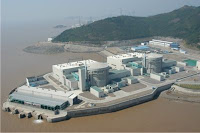












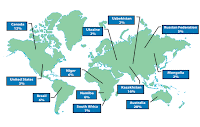



















































































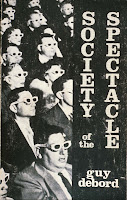









































































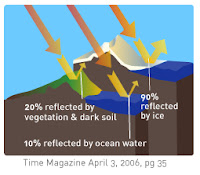















































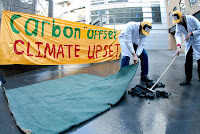








.jpg)














































